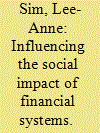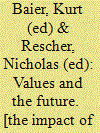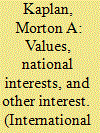|
|
|
Sort Order |
|
|
|
Items / Page
|
|
|
|
|
|
|
| Srl | Item |
| 1 |
ID:
025544


|
|
|
|
|
| Publication |
London, Clive Bingley, 1972.
|
| Description |
222p
|
| Standard Number |
085157131X
|
|
|
|
|
|
|
|
|
|
|
|
Copies: C:1/I:0,R:0,Q:0
Circulation
| Accession# | Call# | Current Location | Status | Policy | Location |
| 011053 | 302/BEN 011053 | Main | On Shelf | General | |
|
|
|
|
| 2 |
ID:
051271


|
|
|
|
|
| Publication |
London, Continuum, 2000.
|
| Description |
xiv, 272p.
|
| Standard Number |
0826450598
|
|
|
|
|
|
|
|
|
|
|
|
Copies: C:1/I:0,R:0,Q:0
Circulation
| Accession# | Call# | Current Location | Status | Policy | Location |
| 048115 | 300.1/Fev 048115 | Main | On Shelf | General | |
|
|
|
|
| 3 |
ID:
167393


|
|
|
|
|
| Summary/Abstract |
A significant number of studies indicate that economic prosperity promotes higher values such as democracy, equality and freedom of choice. Pakistan has witnessed a considerable increase in the size of the middle class contributing to the increased participation of women in the labour force. This increase may translate into higher values among working women across income classes. This article draws on structured interviews (n = 350) with working women in the metropolis Lahore to investigate the extent their socioeconomic status is linked with self-expressive values. By using the ordinal logit model, this paper observes that significant differences exist in women’s perceptions and values across income and education groups. This study confirms that women with higher income and education levels are more independent in their choices. They exercise more authority in their personal and public life. Results also confirm their considerable interest in the democratization process and diminishing involvement in religious practices relative to middle- and lower-income and education groups.
|
|
|
|
|
|
|
|
|
|
|
|
|
|
|
|
| 4 |
ID:
171206


|
|
|
|
|
| Summary/Abstract |
The social impact of the global financial crisis brought global and domestic financial systems into public focus. While over the last ten years governments have introduced a range of regulatory reforms, there are still low levels of public trust in financial sectors, and academics continue to express their concerns about financial systems and their desire for more influence. This is particularly the case for those framing their evaluation of the quality of financial systems in terms of social values. This article offers those seeking more influence over the social values of financial systems, a fresh perspective on their available strategic options for influencing outcomes. It argues that they should consider strategies aimed at making allies of financial sectors and regulators in influencing change. The main advantage of these alliance strategies is that they address key constraints to influence, as identified in existing scholarship, which are difficult to relax because they are tied to features inherent in financial systems. By addressing these constraints, alliance strategies could increase the likelihood that financial system outcomes align more closely with their preferred social values.
|
|
|
|
|
|
|
|
|
|
|
|
|
|
|
|
| 5 |
ID:
121121


|
|
|
|
|
| Publication |
2013.
|
| Summary/Abstract |
This article focuses on the link between the representation of lesbian, gay, bisexual, and transgender (LGBT) people in national legislatures and the existence of equality laws focused on sexual orientation. It addresses three interrelated questions: how many "out" LGBT legislators have served in national parliaments, what explains the cross-national variation in their legislative presence, and what is the relationship between the presence of gay legislators and the enactment of laws that treat gay and straight citizens equally? There is an established literature arguing that the representation of women and ethnic minorities "descriptively" in national legislatures improves the realization of their policy preferences and the position of the group within the society as a whole. This article draws on that literature and extends the analysis to LGBT communities. It finds that the presence of even a small number of openly gay legislators is associated significantly with the future passage of enhanced gay rights, even after including controls for social values, democracy, government ideology, and electoral system design. Once openly gay legislators are in office they have a transformative effect on the views and voting behavior of their straight colleagues. This "familiarity through presence" effect is echoed in studies of U.S. state legislatures and levels of social tolerance of homosexuality in the population at large.
|
|
|
|
|
|
|
|
|
|
|
|
|
|
|
|
| 6 |
ID:
139983


|
|
|
|
|
| Summary/Abstract |
Most countries are grappling with the rising income inequality problem and many governments believe that it is important to reduce income inequality. This is because income inequality is associated with a variety of ‘negative’ outcomes (e.g., protest and low citizen well-being). This seemingly common-sense argument hinges on an untested assumption: Changes in a country’s level of income inequality affect how its citizens perceive and evaluate income inequality. This article argues that this is not theoretically plausible and shows with evidence from China and Japan from 1995 to 2007, that the income inequality of the context a person is embedded in does not systematically affect his or her perception and evaluation of income inequality. Instead, it is the individual socio-psychological factors that affect individual subjective evaluation of income inequality. Thus, while government officials in China and Japan are quick to implement policies that lower the objective dimensions of income inequality, more efforts should focus on subjective income inequality. Simply using the metric of objective income inequality indices (e.g., Gini ratio) as a measure of policy impact may blindside policy makers to the more important subjective income inequality, that is, how people perceive and evaluate everyday income inequality.
|
|
|
|
|
|
|
|
|
|
|
|
|
|
|
|
| 7 |
ID:
034161


|
|
|
|
|
| Edition |
2nd ed.
|
| Publication |
New York, John Wiley & Sons, 1951.
|
| Description |
xi, 124 p.
|
| Series |
Cowles foundation for research in Economics
|
|
|
|
|
|
|
|
|
|
|
|
Copies: C:1/I:0,R:0,Q:0
Circulation
| Accession# | Call# | Current Location | Status | Policy | Location |
| 001938 | 303.4/ARR 001938 | Main | On Shelf | General | |
|
|
|
|
| 8 |
ID:
045668


|
|
|
|
|
| Publication |
Cambriedge, Cambridge University Press, 1981.
|
| Description |
vi, 254 p.
|
| Standard Number |
0874801931
|
|
|
|
|
|
|
|
|
|
|
|
Copies: C:1/I:0,R:0,Q:0
Circulation
| Accession# | Call# | Current Location | Status | Policy | Location |
| 020836 | 303.372/MCM 020836 | Main | On Shelf | General | |
|
|
|
|
| 9 |
ID:
029066


|
|
|
|
|
| Publication |
New York, Free Press, 1969.
|
| Description |
xiv, 527 p.
|
|
|
|
|
|
|
|
|
|
|
|
Copies: C:1/I:0,R:0,Q:0
Circulation
| Accession# | Call# | Current Location | Status | Policy | Location |
| 002284 | 303.372/BAI 002284 | Main | On Shelf | General | |
|
|
|
|
| 10 |
ID:
131017


|
|
|
|
|
| Publication |
2014.
|
| Summary/Abstract |
This article examines the concept of "national interest," from its common use in policy circles to the network of subordinate and superordinate interests in which a state is situated. When analyzing the interest of a social system, like a state, it is important to take into account the level of governance and the interests of the individuals and subsystems upon which the system depends, and consider the value of serving other members in federations, alliances, and blocs even at sacri?ce to itself. A systems approach to politics enables tl1e international relations professional to transcend the problems often encountered by the subjective use of raw power for perceived national interests that fail to accurately anticipate unintended consequences.
|
|
|
|
|
|
|
|
|
|
|
|
|
|
|
|
| 11 |
ID:
043165


|
|
|
|
|
| Publication |
Cambridge, University Press, 1971.
|
| Description |
viii, 184p.
|
| Standard Number |
0521079616
|
|
|
|
|
|
|
|
|
|
|
|
Copies: C:1/I:0,R:0,Q:0
Circulation
| Accession# | Call# | Current Location | Status | Policy | Location |
| 007958 | 302.3/PAT 007958 | Main | On Shelf | General | |
|
|
|
|
| 12 |
ID:
031689


|
|
|
|
|
| Publication |
New York, George Braziller, Inc., 1973.
|
| Description |
x, 215p
|
| Series |
International Library of Systems theory and philosophy
|
|
|
|
|
|
|
|
|
|
|
|
Copies: C:1/I:0,R:0,Q:0
Circulation
| Accession# | Call# | Current Location | Status | Policy | Location |
| 013698 | 003/LAS 013698 | Main | On Shelf | General | |
|
|
|
|
|
|
|
|
|